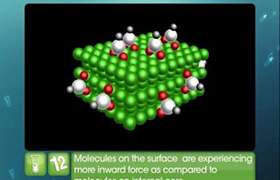CBSE Class 12-science Answered
what is the cause of adsorption?
Asked by zainab haseen | 23 Aug, 2014, 11:26: PM
Adsorption is caused by London Dispersion Forces, a type of Van der Waals Force which exists between molecules. The force acts in a similar way to gravitational forces between planets.
London Dispersion Forces are extremely short ranged and therefore sensitive to the distance between the carbon surface and the adsorbate molecule. They are also additive, meaning the adsorption force is the sum of all interactions between all the atoms. The short range and additive nature of these forces results in activated carbon having the strongest physical adsorption forces of any material known to mankind.
Answered by Prachi Sawant | 25 Aug, 2014, 10:36: AM
Concept Videos
CBSE 12-science - Chemistry
Asked by mallavaramchandrika6 | 29 Sep, 2021, 05:27: PM
CBSE 12-science - Chemistry
Asked by Akshij Nanda | 11 Mar, 2021, 10:21: AM
CBSE 12-science - Chemistry
Asked by shreemuvijihari | 18 May, 2020, 06:29: PM
CBSE 12-science - Chemistry
Asked by kripanjalihimansu | 01 Mar, 2019, 04:16: PM
CBSE 12-science - Chemistry
Asked by niharikapabba2605 | 07 Aug, 2018, 11:42: AM
CBSE 12-science - Chemistry
Asked by niharikapabba2605 | 07 Aug, 2018, 11:41: AM
CBSE 12-science - Chemistry
Asked by niharikapabba2605 | 07 Aug, 2018, 11:41: AM
CBSE 12-science - Chemistry
Asked by niharikapabba2605 | 07 Aug, 2018, 11:37: AM
CBSE 12-science - Chemistry
Asked by niharikapabba2605 | 07 Aug, 2018, 11:35: AM
CBSE 12-science - Chemistry
Asked by niharikapabba2605 | 07 Aug, 2018, 01:21: AM




